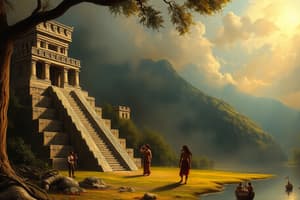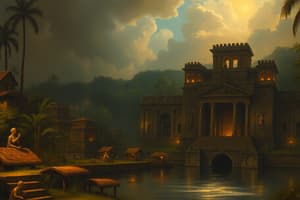Podcast
Questions and Answers
What were the independent political units of the Maya called?
What were the independent political units of the Maya called?
- Tribes
- City-States (correct)
- Empires
- Kingdoms
What roles did nobles play in the Mayan government?
What roles did nobles play in the Mayan government?
Nobles assisted the king in running the government and included powerful lords and military leaders.
Mayan city-states always maintained peaceful relations.
Mayan city-states always maintained peaceful relations.
False (B)
Who had the right to rule in the Mayan city-states?
Who had the right to rule in the Mayan city-states?
What types of crimes were often punished with death in the Maya civilization?
What types of crimes were often punished with death in the Maya civilization?
Commoners had to pay ______ to support the king and the nobles.
Commoners had to pay ______ to support the king and the nobles.
Match the following terms with their descriptions:
Match the following terms with their descriptions:
Flashcards are hidden until you start studying
Study Notes
Maya City-States
- Composed of independent city-states, each with its own government and ruler.
- Shared culture and systems, yet often engaged in conflict, leading to wars and destruction.
- Periods of peace allowed leaders to convene for discussions on important matters.
Rulers: Kings, Priests, and Nobles
- Each city-state was ruled by a king, viewed as chosen by the gods and part-god himself.
- Kings were supported by powerful nobles, including lords and military leaders, in governance.
- Priests held significant influence, advising kings during crises and providing future predictions.
- Kings often acted as priests, blending religious and political roles.
Government and Laws
- The Maya enforced strict laws with severe punishments for serious crimes like murder and arson.
- Accidental crimes or cases of forgiveness could lead to reduced punishments.
- Trials were overseen by local leaders or nobles, with the possibility of the king serving as judge.
- Immediate punishment was customary upon a guilty verdict; options included death, slavery, fines, or public shaming through shaving heads.
- The Maya lacked prisons and implemented immediate punitive measures.
Similarities to Medieval Europe
- Commoners were required to pay taxes to support the ruling class of kings and nobles.
- Men were obligated to serve as warriors under the king’s command, reflecting a feudal structure.
Studying That Suits You
Use AI to generate personalized quizzes and flashcards to suit your learning preferences.




